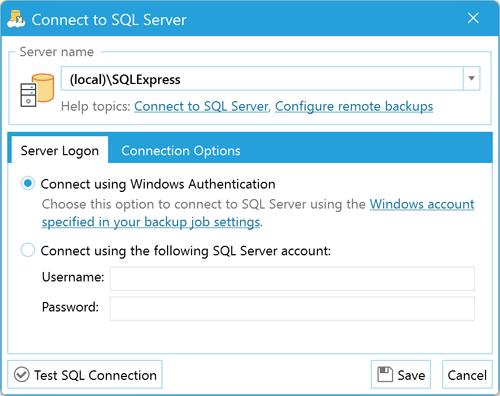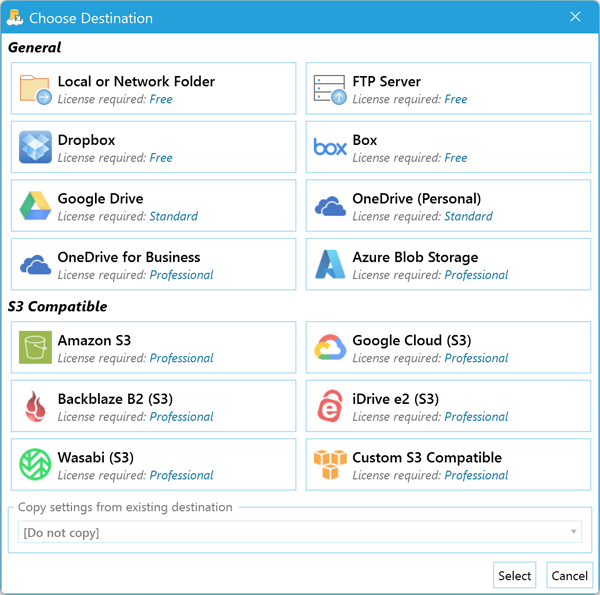Need a streamlined way to back up SQL to Amazon S3? With SQL Backup Master, you can quickly automate backups and securely store your databases in Amazon’s cloud. Follow the steps below to configure your Amazon S3 account, connect to SQL Server, and create a reliable offsite backup solution.
STEP 1 – AMAZON S3 ACCOUNT CREATION AND SETUP
To create an Amazon S3 account, navigate to Amazon’s AWS home page and select Get Started with Amazon S3. Click the Create a new AWS account button below the login field, then follow the on-screen instructions to set up and verify your new AWS account.
STEP 2 – CONNECTING TO YOUR SQL SERVER
In SQL Backup Master, open the Backup and Restore tab and select New Backup. Within the Database Backup Editor window that appears, choose Choose SQL Server to bring up the Connect to SQL Server dialog:

Enter the name of the SQL Server instance you’re connecting to in the Server name field. Common examples include:
- (local)\SQLExpress – Specifies the default SQL Express named instance on the local computer.
- (local) – Specifies the local SQL Server installation (without an instance name).
- Server1\SQLExpress – Specifies the default SQL Express named instance on a remote computer named “Server1.”
- Server1 – Specifies an unnamed SQL Server instance on a remote computer named “Server1.”
You can also use the drop-down arrow in the Server name field to detect local and remote SQL Server instances. Click Test SQL Connection to verify connectivity, then select OK.
STEP 3 – SELECT DESIRED DATABASES TO BACK UP
Now that you’re connected, the Database Backup Editor window will display all available databases under Source. Check the boxes for the databases you wish to include in this backup job.
Alternatively, enable Back up all non-system databases to automatically include any new databases created on your SQL Server over time.
STEP 4 – CHOOSE S3 AS YOUR BACKUP DESTINATION
Under the Destinations header in the Database Backup Editor, click the Add button to specify where your backups will be stored. A new window will appear, listing compatible backup destinations:

Double-click Amazon S3. The Amazon S3 Destination Settings window will then open. This is where you’ll configure your S3 credentials.
Retrieve your Access key and Secret key from the Security Credentials section of your AWS Management Console, and paste them into the corresponding fields in SQL Backup Master. Enter the name of your existing S3 Bucket in the third field. Once you’ve filled in the details, click Test to confirm a successful connection, and then select OK.
Back at the Database Backup Editor window, click the Save icon in the bottom-right corner to finalize your backup destination settings.
STEP 5 – RUN THE BACKUP
Return to the main SQL Backup Master window, select your newly created backup job, and click Back up now to begin sending your SQL Server databases to Amazon S3.
If the backup job doesn’t complete successfully, review the application log file for error details or additional troubleshooting information.
That’s it! You are now backing up your SQL database to Amazon S3. By automating backups with SQL Backup Master, you’ll have peace of mind knowing your critical data is protected offsite and readily available for recovery.
If you’re looking for additional backup destinations—such as Dropbox, OneDrive, or Google Drive—be sure to explore the full feature set of SQL Backup Master by Key Metric Software.

